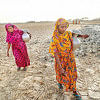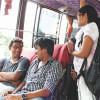Rural women must be recognised for their contribution

Gender discrimination in rural areas across Bangladesh continues to be a formidable barrier to both social and economic development, particularly in the agricultural sector. Despite their critical roles in farming, processing, and post-harvest activities, rural women face entrenched inequalities in wages, opportunities, and recognition. As Shahnaz Begum, a farmer from Khulna, poignantly states, "We work just as hard as men, but the pay is never the same. While men often earn up to Tk 200 per day, women receive Tk 70 for similar work."
This wage disparity reflects a broader trend in which rural women are disproportionately affected by social, cultural, and economic inequalities. According to a 2023 report by the Bangladesh Bureau of Statistics (BBS), gender pay gap remains a significant issue in rural areas, with women in agriculture earning an average of 30-40 percent less than their male counterparts for the same work. The report further emphasises that women in rural Bangladesh perform up to about 60 percent of the labour in agriculture, but remain largely invisible in leadership and decision-making roles.
Despite their significant contributions to the agricultural economy, rural women are often marginalised. They are excluded from access to land, credit, and technology—resources that are essential for improving productivity and achieving economic independence. According to a 2022 Oxfam study, only 13 percent of rural women in the country own land. This lack of access to land and resources limits women's ability to invest in farming and start their own businesses. "I've never been able to buy land or take a loan without my husband's signature," shares Laila, a rural entrepreneur from southwestern Bangladesh. "Without access to resources, how can we grow our businesses or improve our lives?"
Sexual harassment in rural workplaces is another pervasive issue that compounds these challenges. A 2021 study by ActionAid found that 45 percent of rural women in South Asia, including Bangladesh, experience harassment in the workplace. However, many women remain silent due to fear of retaliation and lack of support. One such case is Ayesha, a farm worker from Satkhira, who was forced to quit her job after facing harassment from her supervisor. "I couldn't keep quiet anymore, but no one supported me," she recalls. "I had no choice but to leave." This type of harassment not only undermines women's well-being, but also has long-term economic consequences, as they are forced to withdraw from the workforce.
The implications of such gender-based discrimination are far-reaching, not just for individual women but for the economy at large. According to McKinsey, closing gender gaps in labour markets could add $12 trillion to the global economy. In Bangladesh, where agriculture employs over 40 percent of the workforce, advancing gender equality in rural areas could significantly boost national productivity and reduce poverty. As Hasina, a leader of a rural women's cooperative in Satkhira, says, "If we had equal opportunities, we could improve not only our families but also our communities." Women's economic empowerment can lead to the development of rural economies, better health outcomes, and improved quality of life for all.
Addressing these inequities requires robust policy interventions. The government must prioritise wage transparency and enforce equal pay for equal work in rural sectors. Furthermore, rural women must have equal access to land, credit, technology, and training to improve their productivity and economic independence. "We need financial independence," says Rina, a small-scale farmer from Jashore. "Only then can we break the cycle of poverty." Providing women with access to microfinance and ensuring that they can take out loans without the need for male co-signers would empower them to invest in their farms or start small businesses, ultimately improving their families' living standards.
Encouraging women to take leadership roles in rural cooperatives and agricultural enterprises is another vital step in addressing gender inequality. As Salma, a rural cooperative leader, aptly puts it, "Gender equality is the foundation of a prosperous Bangladesh. We cannot afford to leave women behind." By addressing gender discrimination in rural workplaces, Bangladesh can harness the power of its women to drive sustainable economic growth, reduce poverty, and improve the quality of life for all its citizens.
Furthermore, addressing the issue of sexual harassment in rural workplaces is crucial for creating safe and supportive environments for women. The government must establish and enforce clear legal frameworks to prevent harassment, ensure women's safety, and encourage reporting of such incidents without fear of retaliation. Local authorities and rural development programmes must work closely with women's organisations to create awareness and provide support for victims of harassment.
By addressing gender discrimination, we can unlock the potential of millions of women, enabling them to contribute to a more equitable, prosperous future. Gender equality in rural Bangladesh is not merely a goal—it is a necessity for the nation's development.
Md. Al-Mamun is social scientist at BRAC Institute of Governance and Development (BIGD).
Views expressed in this article are the author's own.
Follow The Daily Star Opinion on Facebook for the latest opinions, commentaries, and analyses by experts and professionals. To contribute your article or letter to The Daily Star Opinion, see our submission guidelines.

 For all latest news, follow The Daily Star's Google News channel.
For all latest news, follow The Daily Star's Google News channel. 










Comments